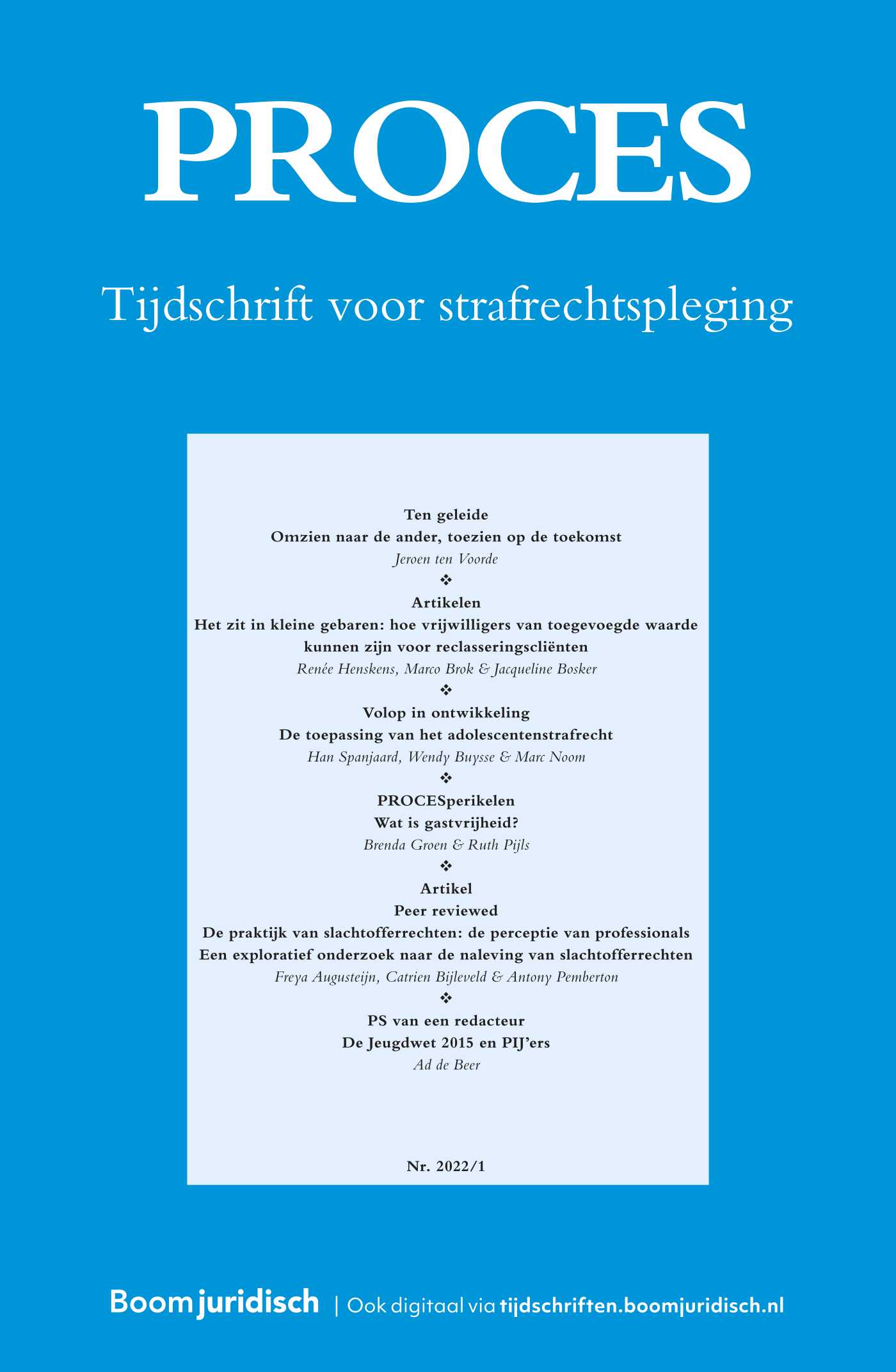|
The probation service has a legally firmly embedded mandate to guide the Tbs-patient (Forensic Psychiatric Patient, subject of a hospital order) during his return to society and to supervise this return. Also because of incidents with Tbs-patients who returned to society, a new way of guidance and supervision was recently developed, in which the treating clinic, the GGZ (general mental health care institutions) and the probation service cooperated and enhanced each other’s expertise, more than had been customary in the past. The aim was to reduce the risk of re-offending as far as possible. The first part of this article deals about Forensic Psychiatric Supervision and the problems regarding the links between the judiciary circuit and the GGZ. The second part outlines the role of the probation service and is concerned with the importance ánd the danger of risk assessment and risk control. Some conclusions are drawn. |


PROCES
Meer op het gebied van Criminologie en veiligheid
Over dit tijdschriftMeld u zich hier aan voor de attendering op dit tijdschrift zodat u direct een mail ontvangt als er een nieuw digitaal nummer is verschenen en u de artikelen online kunt lezen.
| Redactioneel |
Goede voornemens? |
| Auteurs | Mr. drs. Sigrid van Wingerden |
| Auteursinformatie |
| Artikel |
Reclassering op een kruispunt(?)Rol en positie van de reclassering bij Forensisch Psychiatrisch Toezicht |
| Trefwoorden | forensic psychiatry, probation service, general mental health, forensic psychiatric supervision |
| Auteurs | Dr. Jaap van Vliet |
| SamenvattingAuteursinformatie |
| Artikel |
Tegenspraak bij de politieDistantie, betrokkenheid en doorwerking |
| Trefwoorden | tunnel vision, critical review, criminal investigation, police |
| Auteurs | Mr. drs. Renze Salet en Prof. dr. ir. Jan Terpstra |
| SamenvattingAuteursinformatie |
|
After some serious failures in criminal justice procedures, in 2006 ‘critical review’ was introduced in the Dutch police as a measure to prevent tunnel vision in criminal investigation. An analysis of 26 review cases and interviews with representatives of the Dutch police forces shows that in practice reviewers are confronted with a fundamental dilemma of distance vs. involvement in their relation with criminal investigation team. Critical review proves to have concrete effects on the criminal investigation process, although their scope usually appears to be limited. Although these effects are modest and review takes scarce police resources, the authors recommend a continuation of critical review. |
| Artikel |
Uitsluiting van ex-gedetineerden door verzekeraars |
| Trefwoorden | selective exclusion, prisoners, actuarial justice, insurance |
| Auteurs | Lucrecia Paulina MSc en Dr. mr. Marc Schuilenburg |
| SamenvattingAuteursinformatie |
|
In this article we address the question of whether former prisoners are excluded by insurance companies when they apply for insurance. We found that, in several cases, ex-prisoners had been denied insurance in the Netherlands. This so-called ‘actuarial justice’ is accompanied by a great deal of discretionary power in the hands of insurance companies. Moreover, the results emphasize that former prisoners are still in an extremely vulnerable position in society. The article concludes by emphasizing that this form of ‘selective exclusion’ happens to a variety of risk groups in society. |
| Praktijk |
De regiebijeenkomst |
| Auteurs | Mr. Rob van Noort |
| Auteursinformatie |
| Column |
Het verfrommelde slachtoffer |
| Auteurs | Mr. Jeannette Bruins |
| Auteursinformatie |
| Diversen |
PROCES Chronologisch register 2012 |
| Diversen |
PROCES Auteursregister 2012 |
